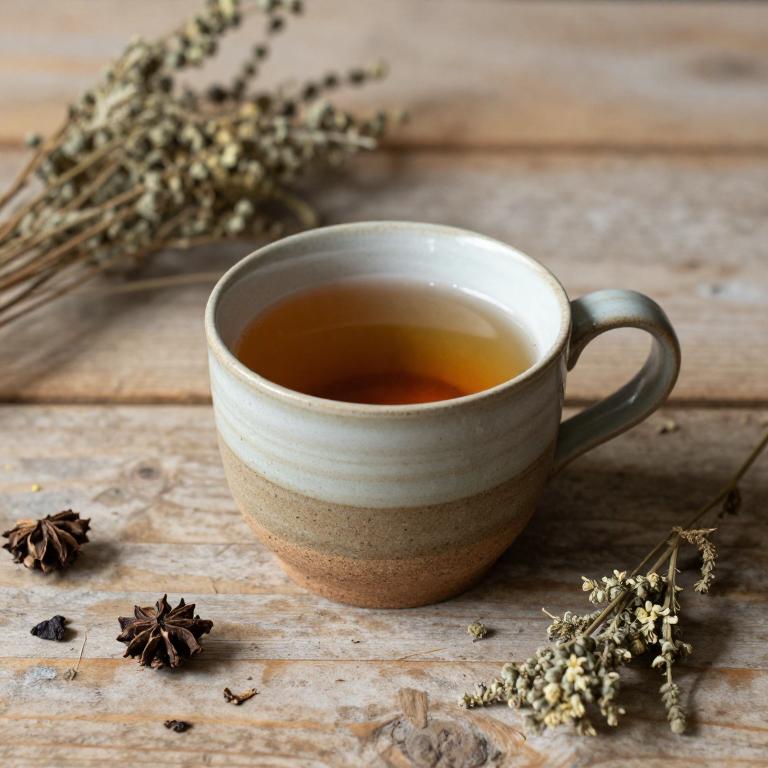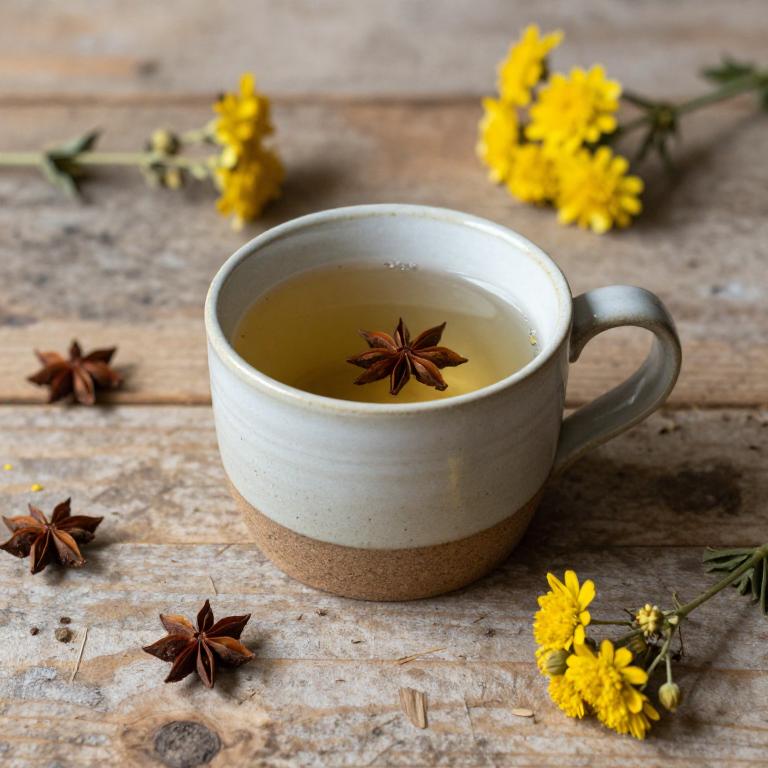10 Best Herbal Teas For Constipation

Herbal teas can be an effective natural remedy for constipation, offering gentle relief without the side effects of over-the-counter medications.
Common herbs used in these teas include senna, ginger, fennel, and dandelion, each known for their mild laxative or digestive properties. Senna, in particular, is often recommended for its mild yet effective action in stimulating bowel movements. To prepare these teas, simply steep the dried herbs in hot water for several minutes, then drink them warm.
It is important to consult a healthcare provider before using herbal teas, especially for prolonged periods or in combination with other medications.
Table of Contents
- 1. Fennel (Foeniculum vulgare)
- 2. Aloe vera (Aloe barbadensis)
- 3. Ceylon cassia (Cassia angustifolia)
- 4. European plum (Prunus domestica)
- 5. Cumin (Cuminum cyminum)
- 6. Stinging nettle (Urtica dioica)
- 7. Blessed thistle (Cnicus benedictus)
- 8. Golden shower tree (Senna alata)
- 9. Common buckthorn (Rhamnus frangula)
- 10. Anise (Pimpinella anisum)
1. Fennel (Foeniculum vulgare)

Foeniculum vulgare, commonly known as fennel, is a traditional herbal remedy often used in herbal teas to alleviate constipation.
The seeds of the fennel plant contain compounds like anethole and limonene, which have mild laxative properties that can help stimulate bowel movements. When brewed into a tea, fennel can soothe the digestive tract and promote regularity, making it a gentle option for those experiencing occasional constipation. It is typically consumed warm, often combined with other herbs like ginger or peppermint for enhanced digestive benefits.
However, it is important to consult a healthcare provider before using fennel tea, especially for prolonged use or in individuals with existing medical conditions.
2. Aloe vera (Aloe barbadensis)

Aloe barbadensis, commonly known as aloe vera, is often used in herbal teas to support digestive health, including the relief of constipation.
The gel extracted from the aloe plant contains mucilage, which can help soften stools and promote regular bowel movements. While aloe vera tea is generally considered safe when consumed in moderation, it is important to note that excessive consumption may lead to gastrointestinal discomfort or electrolyte imbalances. Some studies suggest that aloe vera may enhance gut motility, making it a potential natural remedy for occasional constipation.
However, it is advisable to consult a healthcare professional before using aloe vera tea, especially for individuals with pre-existing medical conditions or those taking medications.
3. Ceylon cassia (Cassia angustifolia)

Cassia angustifolia, also known as Indian senna, is a popular herbal remedy used to treat constipation due to its mild laxative properties.
The tea is made by steeping the dried leaves of the plant in hot water, creating a bitter but effective beverage. It works by stimulating the digestive system and promoting bowel movements without causing significant dehydration. Regular consumption of cassia angustifolia tea can help alleviate occasional constipation when used in moderation.
However, it is important to consult a healthcare professional before using it, especially for prolonged periods or in combination with other medications.
4. European plum (Prunus domestica)

Prunus domestica, commonly known as the European plum or common plum, is often used in herbal teas to help alleviate constipation due to its high fiber and sorbitol content.
The seeds of the plum contain a natural laxative compound called sorbitol, which draws water into the intestines, softening stool and promoting regular bowel movements. Herbal teas made from dried plum slices or plum leaves can be consumed as a soothing and mild remedy for occasional digestive discomfort. These teas are generally safe for most adults but should be consumed in moderation to avoid overhydration or gastrointestinal upset.
Incorporating Prunus domestica into a daily routine can support digestive health and provide a gentle, natural alternative to conventional laxatives.
5. Cumin (Cuminum cyminum)

Cuminum cyminum, commonly known as cumin, is a popular herbal ingredient used in teas to aid digestion and relieve constipation.
The seeds of cumin contain compounds like thymol and limonene, which have mild laxative properties that can help stimulate bowel movements. When brewed into a tea, cumin can promote healthy gut motility and ease discomfort associated with slow digestion. To prepare the tea, simply steep a teaspoon of cumin seeds in hot water for several minutes.
While cumin tea is generally safe for most people, it is advisable to consult a healthcare provider before using it regularly, especially for those with existing digestive conditions or on medication.
6. Stinging nettle (Urtica dioica)

Urtica dioica, commonly known as stinging nettle, is a herbal remedy that has been traditionally used to support digestive health.
When brewed into a tea, it can help alleviate constipation by promoting bowel movements and increasing intestinal motility. The tea contains compounds such as flavonoids and potassium, which may help soften stools and ease digestive discomfort. It is often recommended as a natural alternative to over-the-counter laxatives, though it should be consumed in moderation.
However, individuals with kidney issues or those taking certain medications should consult a healthcare provider before using stinging nettle tea.
7. Blessed thistle (Cnicus benedictus)

Cnicus benedictus, commonly known as blessed thistle, is a herbal remedy often used to support digestive health and alleviate constipation.
This herb contains compounds such as sesquiterpene lactones and flavonoids, which may help stimulate bowel movements and improve gastrointestinal motility. Blessed thistle is typically prepared as a tea by steeping the dried leaves and flowers in hot water for several minutes. While it is generally considered safe for short-term use, it is important to consult a healthcare provider before incorporating it into a regimen, especially for individuals with existing health conditions or those taking medications.
Regular consumption of blessed thistle tea may offer natural relief for mild constipation when used as part of a balanced diet and lifestyle.
8. Golden shower tree (Senna alata)

Senna alata, commonly known as the velvet bean or wild senna, is a traditional herbal remedy often used to relieve constipation due to its mild laxative properties.
The plant contains compounds such as sennosides, which stimulate the digestive tract and promote bowel movements without causing significant dehydration. To prepare a herbal tea, the dried leaves or seeds of Senna alata are steeped in hot water for several minutes, creating a soothing and effective remedy. While it is generally safe for short-term use, excessive consumption can lead to gastrointestinal discomfort or electrolyte imbalances.
As with any herbal remedy, it is advisable to consult a healthcare professional before using Senna alata, especially for individuals with pre-existing medical conditions or those taking other medications.
9. Common buckthorn (Rhamnus frangula)

Rhamnus frangula, also known as common buckthorn, is a traditional herbal remedy often used to treat constipation due to its high content of anthraquinone compounds, which act as natural laxatives.
When prepared as a herbal tea, Rhamnus frangula can stimulate bowel movements by increasing intestinal motility and softening stools. However, it should be used with caution, as prolonged use may lead to dependency or electrolyte imbalances. It is typically recommended for short-term relief under the guidance of a healthcare professional.
Despite its effectiveness, it is important to consult a physician before using Rhamnus frangula, especially for individuals with existing gastrointestinal conditions or those taking other medications.
10. Anise (Pimpinella anisum)

Pimpinella anisum, commonly known as anise, is a popular herb used in herbal teas to help alleviate constipation due to its mild laxative properties.
The seeds of the anise plant contain compounds like anethole, which can stimulate digestive processes and promote regular bowel movements. When brewed into a tea, anise can soothe the digestive tract and ease discomfort associated with constipation. It is often combined with other herbs like fennel or ginger to enhance its effectiveness.
However, it is important to consult a healthcare provider before using anise tea, especially for prolonged periods or in high doses, to avoid potential side effects.